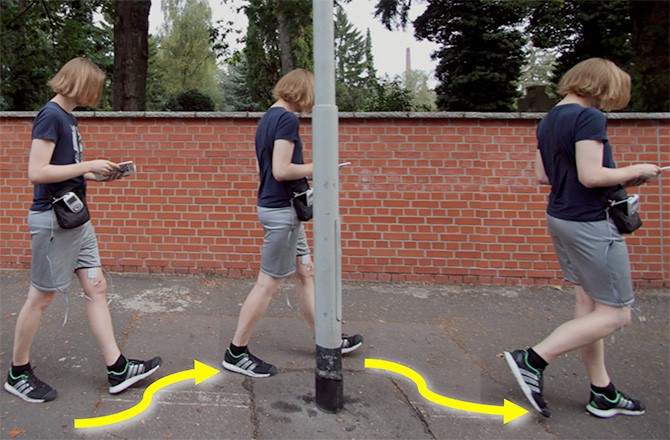
As impractical as it may be, walking is still my favorite mode of transportation. Not only does it promote benefits to my mental and physical health, but the act itself jumpstarts my creative thinking. Unfortunately, many people disagree and come up with asinine excuses against the activity; excuses such as, “I’ve no idea where to go,” or “I’ve walked through there hundreds of times already.” But thanks to German students from the University of Hannover, one doesn’t even have to think about walking anymore; they’ve developed a device to remotely control people’s gait through electrical stimulation of leg muscles. The process induces a remote “human cruise control” type action in which the “controlee” directs the turning of the wearer.
The designers jokingly claim that they’ve created the device as a means of allowing people to continue fiddling with their smartphones as they walk, unperturbed by collision with objects in the real world. Jesting aside, the technology could theoretically be used to conduct interesting self-guided tours of cities, enhance exercise regiments, and even assist the visually-impaired/dementia-victims avoid find their way home — there’s plenty of potential uses.
“The idea is to help people navigate without knowing it,” explains Max Pfeiffer, a graduate student at the University of Hannover. “You start to walk, you relax, and end up at the point without noticing that you were guided to this place.”
The device works by attaching electrodes to a person’s Sartorius muscles, which are connected to a device resembling the muscle stimulation device used by physical therapists, and a wireless control box placed on the waist which is wirelessly tethered to a smartphone.
The team recorded the video below of a subject outfitted with the prototype device walking through the park.
Roberta Klatsky, professor of human-computer interactions at Carnegie Mellon University, doesn’t believe the technology will ever replace full-fledged navigation guide, but it may help those with limited vision or mental capacities if paired with a working obstacle detection system.
Source: DiscoveryNews
Advertisement
Learn more about Electronic Products Magazine





